|
Flyfisher
Here are some photos of Hugh
Replogle's Flyfisher.
Hugh built the boat at WoodenBoat School in
a 2006 week long class and then finished it
out at home in Virginia. He altered the forward
deck and created this really beautiful deck
that lifts off completely yet provides water
tight storage. This a really excellent example
of an owner/builder modification.
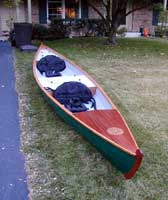 |
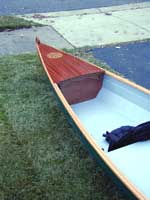 |
|
(click
images to enlarge) |
|
Hugh says this is still a work
in progress as he plans to add an electric
trolling motor in the near future. The third
photo is Hugh and his son at the Launch.
David Nichols
|
 |

Gavin Atkin is a writer and editor by profession,
a wordsmith with a love of boats and boating.
An Englishman, with roots deep in a country
steeped in the history of boating, he has
started a website,
intheboatshed.net where articles
on rebuilds, restorations and new builds of
very old designs will be featured.
Remember that the oldest working boat in
the world is within a days drive of where
he lives, she is 198 years old this year and
still fishing, and that institutions like
the Windermere
Steam Museum, and the Bristol
Maritime Museum with working and static exhibits
that go back centuries are also within his
reach.
There are very old steam tugs, square riggers
such as The Cutty Sark and Victory, Small
boats such as the Thames Wherries still available
for hire, broads yachts, canal boats and (my
particular passion) the Solent punts, Falmouth
Quay punts and Ichen Ferries all within his
ability to get there and get articles to us.
It's early days for the site and its editor
yet, but if we all get in there and support
him, we could have a real treasure.
Do go and visit the website,
contribute to it you can or just notify him
of a webpage of interest, he deserves the
support:
John Welsford
https://intheboatshed.net
|
 |
Sherpa Xebec Update
Well, all interested parties,
today, here is the first sail of a “big
rig Sherpa”.
This sail was specifically designed by Ross
Lillistone and it is 34% bigger than the original,
and a bit squat to fit the 3m. mast that I
had. The sail is now 5.24 sq.m. (this sail
reefed, is same size as the original at about
3.9 sq.m.) and she set beautifully, as designed,
spot on with virtually no weather helm. Sailed
her right off the beach, no hands. (apologies
to sailmaker “Clive” as a later
tension adjustment got rid of that little
sail kink near the front end of the “yard”)
Sherpa “Xebec” now is an even
better boat and the wind on the day up to
20K, with no problems of overpowering. I’m
90 kg. and I reckon I would be reefing this
rig at about 25K. plus. (The original sail
and I have had several excursions now with
30K wind and is still an easy sail) Today,
in the earlier lighter wind, with the big
rig, she really lifted away beautifully, and
in my humble opinion is the best sail for
this great little boat. She spins on a penny
round and round and is incredibly stable.
I believe these stable little boats should
be everywhere that any beginner sailors are,
as she would recruit many into this sport.
(no small thanks, to that easy easy rig).
She rows well and works well with my little
outboard (2.5 hp. Suzi.) just on 1/3 throttle,
so satisfies many boating needs.
(And yes I can’t fit the knocked down
rig inside the boat, but it sneaks over the
transom and locates with ease with a bungee
chord, so no worries.)
Thanks, regards, John Shrapnel.
|
 |
Pearls
My friend and contributor to
Duckworks, Lee Martin has been trailer cruising
around the eastern USA and Canada this summer.
Occassionally he has sent these pearls:
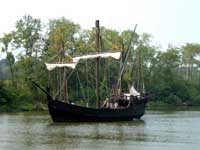 |
The
ultimate home built cruiser..
(click
images to enlarge) |
|
| The
driver miraculously survived! |
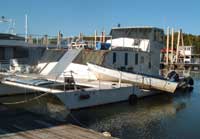
|
|
|
 |
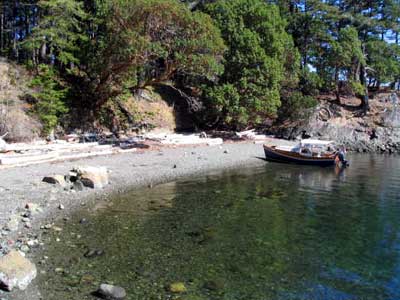
https://skiffamerica.com/
This site has more photos of Donovan's "Journeys"
Latest one to the Pacific Northwest San Juan
Islands.
Kilburn Adams
|
 |
A Strange Cat
Has anyone read anything about
this boat? Strange Boat... These pictures
were taken in the Port of Ilwaco off the Washington
State coast. The crew wore civilian clothes
but guarded the boat closely and would not
answer any questions. It was suggested it
may be something Boeing is working on.
The pontoons appear to be made
of very thick rubber and may be fuel cells.
Note that each of the steel spider-like legs
are jointed in three places. Perhaps the boat
can be lowered in calm seas and raised when
it is rough. The boat had no name or number...
A friend who lives there said it arrived out
of the fog the nite before. The crew would
not say who they were or where they were from,
and were not allowed to discuss the craft.
Notice how the rear of the cabin can be lowered
into the water but has a very small prop.
One man stayed on the float at all times
... none wore uniforms.
...submitted by Bill Tosh and Bruce Armstrong
|
 |
|
Hi Chuck
It's been a long time since I e-mailed or called
you, The 43' full rigged ship my wife and I
are building is coming along well, we took off
the protective cover and finished the cap rails
Pilot house and are finishing the stern gallery.
The rigging hardware is coming along well, with
the help of some friends, we have fittings to
make the Harken roller reefing work on the yards.
We have tested the 40 hp electric motor and
the windlass motor but still have much work
to do on the control systems.
The Sail cloth we bought from you is still
in the rolls, and it looks like next year before
we can start making sails.
Wayne Tedder
|
 |
Wanderer Update
I'm having a great time. I understand
why people cautioned me to try a proven design
or a kit ... this is a pretty big first effort.
But so far so good ... it tickles me how much
the hull looks like the drawing on Carlson's
program. But it does take time .. I'm behind
on lots of other things. Today the weather
got really rainy or I'd be glassing right
now. Here are four pics - not a report for
Duckworks - I want to select a sequence with
short comments and do it right.
Bob Throne
|
 |
Little Laker
Chuck,
At some point, I mentioned Little
Laker at 80 pounds and 5 HP.
I downgraded the HP in the final specs because
I felt that 5 hp might over power the light
boat and make it flighty or skiterish at top
speed.
I also felt that the boat could
be built lighter than 80 pounds but the weight
is only an estimate as a boat can get heavy
in a hurry depending on what goes on it. A
case in point is a builder in New Zealand
that was planning to use teak as the skeggs
and inwale/outwale. A good choice but it will
make the boat heavier. 9 oz cloth rather than
6 or 4 oz will also make a great deal of difference
in the overall weight. I do feel that if a
builder is very careful and doesn't add on
the boat will weight very close to 65 pounds.
It is possible add 5 pounds of epoxy without
really trying. Perhaps it is best to say the
weight is between 65 and 75 pounds if a builder
is careful.
There are no photos available
of a completed Little Laker but here are some
of a boat under construction in New Zealand.....
David Nichols
|
 |
I think I'm addicted...
... No I AM addicted; just ask
my wife. Everytime I mention the "B"
word, she just sighs and rolls her eyes. Seems
like all I think about is boats; reading about
them, building them, paddling them, rowing
them. Now I'm writing about them, too.
Here are a few pictures of
a canoe I built about a month ago. I had some
scraps of plywood laying around the garage
and a set of bottom panels for the Podyak
that I built a while back. I recut the bottom
panels into a "canoe" shape and
kept some of the V at the ends while making
the center flat. Then I stitched the sides
to the bottom, fiberglassed the seams, added
rails, breasthooks and some leftover paint
and next thing I knew, there was a canoe in
the garage. I also picked up a cheap woodburning
iron and tried my hand at a little ornamentation
on the for'd breasthook. (Pardon the dragon
flies. They were out in force that day.)
Thanks to Joe Tribulato; his
La Petite Bateau was
the inspiration for this one. I did remove
the center thwart and replace it with two
closer to the ends, so I can trim the boat
a little more level.
Hope you enjoy it. I know I do,
Tim
|
 |
Origami Dinghy Kit
Ahoy Chuck,
Attached is a pic from Fyne boat kits who
are in the process of making a kit version
of the Origami Dinghy. It's all very exciting
and very good news since here is the proof
that my plans work. It doesn't matter how
many times I do it, it's still nice to know
that others can do it too, that's the point
after all!

It's not a very good pic but it certainly
looks like an Origami to me.
Have just got back from the Cannes regatta.
What a sight. The most amazing collection
of classic yachts to be seen anywhere in the
world. Now St Tropez. It's madness. The bay
is full of anchored yachts and motorboats
and today the rest of the competitors arrive
from Cannes so by now the port will be heaving.
I don't know how the crews manage. Many of
the boats have no winches and it's hard work.
Then they go partying most of the night and
go racing again! This goes on from April to
October. There is one boat here, about 80
feet it carries 45 crew for racing!!! Or about
3 tons of people.
Good movable ballast.
All the best
Benjy
|
 |
Chippy's Clip
Chuck,
I came across a little metal clip which
is invaluable when sawing large sheets of
plywood. It works equally well with a handsaw
as with a powersaw such as a Skilsaw.
It prevents the sagging and consequent binding
of the saw blade. I have tried to trace the
maker of this tool without success, and the
distributer has given up on it. Evidently
the maker has gone out of business, as far
as I can ascertain.
I shall send you an example for your evaluation,
and it may well be within your capacity to
have such a thing made in the US.
I am sure that your clients/readers would
leap at such an aid.
Yours etc,
Alvan Eames.
(Anyone who knows
of a source for this
clip, please let me know - Chuck)
|
 |
Model Boats
Heres a couple of pics of
some of the fleet
Brian Cuthbert
|
 |
The Classic WoodPussy Catboat is now
being built on Long Island
By Tony DELoia
Author’s note: I first noticed the
WoodPussy Catboat on the Hudson River while
sailing Lightnings in the 1950’s. We
became reacquainted through my membership
in the United States WoodPussy Class Association
(USWPCA)
The Palmer Scott Company, New Bedford Ma,
first built WoodPussys in 1945 as planked
wooden boats. Other builders later offered
fiberglass and cold-molded hulls. Less than
75 of the estimated 1000 + hulls originally
built are known to have survived.
The Frank
M. Weeks Yacht Yard in Patchogue
NY (Long island) is building the Philip L.
Rhodes designed 13’ 6” Marconi
rigged WoodPussy Catboat in fiberglass. Brian
and Kevin Week’s grandfather Frank,
founder of the yard in 1898, sailed a WoodPussy
almost daily for 15 years in his retirement
in Florida. Brian sailed the first new WoodPussy
hull in regattas on Long Island in Sept. 2006.
Hull # 1101, the prototype, successfully competed
in the WoodPussy “Solo Bowl” in
Little Silver NJ in mid - Sept.
Brian has successfully competed at the International
level in various dinghy classes with two National
Championships under his belt. He served as
class president of the United States Sunfish
Class for 6 years. Weeks Yacht Yard also has
exclusive rights to build the Force 5 Sailboat.
The United States Woodpussy Class Association
(USWPCA) met with Brian in late February,
in Red Bank N.J. Jeff Jacobi, then Commodore
of the class, and 5 past national champions,
discussed the “Renaissance of the WoodPussy
for the 21st century” with Brian to
assure new hulls made from molds used almost
40 years ago would not render existing hulls
obsolete for fleet racing. Original molds
were strengthened, trued and fared to assure
a quality product.
Ian McCurdy of McCurdy and Rhodes, a yacht
design firm, assisted Brian in reviewing original
plans during the planning process. His dad,
Jim McCurdy, worked for Philip L. Rhodes,
then partnered with Bodie Rhodes, Phil’s
son, He continues the family tradition in
boat design and assists the NorthEast WoodPussy
Association (NEWPA) as its fleet measurer.
The beauty of these family day sailors is
enhanced with cockpit trim features in teak
or mahogany. Convenient sail controls serve
to satisfy requirements of day sailors and
fleet racers. “Specialty” rigging
and additional options are offered at extra
price for highly competitive fleet racers.
Frank M. Weeks Yacht Yard is currently offering
the WoodPussy Cat Boat for Spring 2007 delivery
(Patchogue NY). Interested sailors are asked
to visit the website https://www.wpcatboats.com/
for information about this boat and for current
pricing.
|
 |
SIOUX TOOLS SIGNATURE DRILL SERIES
FOR TODAYS MANUFACTURING – PERFORMANCE,
SERVICEABILITY, ERGONOMICS AND VALUE…
(Murphy, North Carolina) - Sioux
Tools announces the addition of Signature
Series Drills to the line up. Through next
generation ergonomics and the continued focus
on productivity and operator safety comes
the development of the Sioux Tools Signature
Series Drill line. Signature Series Drills
are used in applications ranging from manufactured
housing and wood working to light assembly.
The powerful five vane motor makes these drills
great for drilling applications that contain
ferrous and non-ferrous metals, wood and composite
materials.
The Signature Series Drills offer great value
with a 3 planet gear system for increased
life and load capacity. The Sioux tools Signature
Series Drill line reduces operator fatigue
by offering a low sound level and low vibration
solution! Operator comfort is achieved through
the implementation of a light weight aluminum
housing and a comfort grip. Drills are available
in both reversing and non-reversing pistol
grip and lever handle
configurations.
Signature Series is a pneumatic tool program
inspired by the operator and designed by Sioux
Tools. Since 1914, Sioux Tools has been committed
to bringing productive solutions to the pneumatic
power tool industry. Signature Series is an
innovative pneumatic power tool program created
through the implementation of next generation
ergonomics, productivity enhanced features,
serviceability and value.
# # #
For additional information,
visit www.siouxtools.com
|
 |
NauticalCharts.Com Announces
Gold Series Inshore Fishing Chart #39F
 Nov
03, 2006 Chart publisher Waterproof Charts,
Inc. has announced a brand new addition to
the Gold Series: Inshore Fishing Chart, #39F
Everglades City to Lostman’s River.
This newly compiled chart is the ONLY ONE
to show the popular GRASS FLATS on the outside
and pinpoints dozens of specific areas for
the major species caught in the area, as well
as places to catch bait. Details of Big Lostman’s
and Rodgers River Bay as well as highlighting
the Wilderness Waterway are also included.
You will also get campsites with their respective
GPS coordinates and boat ramp locations as
well. There is NO BETTER fishing chart available,
guaranteed!!! A HUGE amount of information
for only $24.95 retail. The folks at Waterproof
Charts have complete Inshore coverage from
Tampa Bay to Miami! Nov
03, 2006 Chart publisher Waterproof Charts,
Inc. has announced a brand new addition to
the Gold Series: Inshore Fishing Chart, #39F
Everglades City to Lostman’s River.
This newly compiled chart is the ONLY ONE
to show the popular GRASS FLATS on the outside
and pinpoints dozens of specific areas for
the major species caught in the area, as well
as places to catch bait. Details of Big Lostman’s
and Rodgers River Bay as well as highlighting
the Wilderness Waterway are also included.
You will also get campsites with their respective
GPS coordinates and boat ramp locations as
well. There is NO BETTER fishing chart available,
guaranteed!!! A HUGE amount of information
for only $24.95 retail. The folks at Waterproof
Charts have complete Inshore coverage from
Tampa Bay to Miami!
Waterproof Charts, Inc is the country’s
largest private publisher of individual nautical
charts. Founded in 1984, the company was first
to successfully produce and market marine
charts on waterproof, tear- resistant paper.
With over 180 editions the Original Waterproof
Charts cover the most popular recreational
boating areas in the country.
Learn more...
NauticalCharts.Com
Kerri Kibbe
Sales Manager
email: kkibbe@nauticalcharts.com
|
 |

It's Hunting Season!!!
And the Coast Guard Auxiliary offers seven
tips to keep hunters safe
Daffy: "It's Wabbit
season!"
Bugs: "Duck season!"
Daffy: "Wabbit season!"
Bugs: "Duck season!!"
Daffy: "Wabbit season!!"
Bugs: "Duck season!!!"
Daffy: "Wabbit season!!!"
USCG Auxiliary: "It's Hunting Season
and we want you to be safe!!!"
And while we all enjoyed Daffy Duck and Bugs
Bunny fight over which season it actually
was, they never did get around to saying that
much of the hunting season is done in and
around water.
Hunters that are engaged in hunting in and
around water should be just as aware of boating
and hypothermia issues as your average recreational
boater. In fact, those hunters that use boats
as platforms from which to hunt are boaters!
We encourage all hunters in and around water
to follow these simple rules:
-
Wear a PFD (Personal Flotation
Device - Life Jacket). A Type III Float
Coat or Exposure Suit or Type IV (inflatable)
would be your best bet.
-
File a Float Plan with
your friends, family or hunting lodge.
-
Don't drink Alcohol before
hunting/boating.
-
Check the weather before
you head out and dress appropriately.
-
Take a safe boating course.
-
-
For more information about safe boating,
contact your local Coast Guard Auxiliary Flotilla.
Use our Flotilla Finder at https://ff.cgauxa.org.
The United States Coast
Guard Auxiliary is composed of uniformed,
non-military volunteer's who assist the Coast
Guard in all of its varied missions, except
for military and direct law enforcement. These
men and women can be found on the nation's
waterways, in the air, in classrooms and on
the dock, performing Maritime Domain Awareness
patrols, safety patrols, vessel safety checks
and public education.
|
 |
|
|
|
|